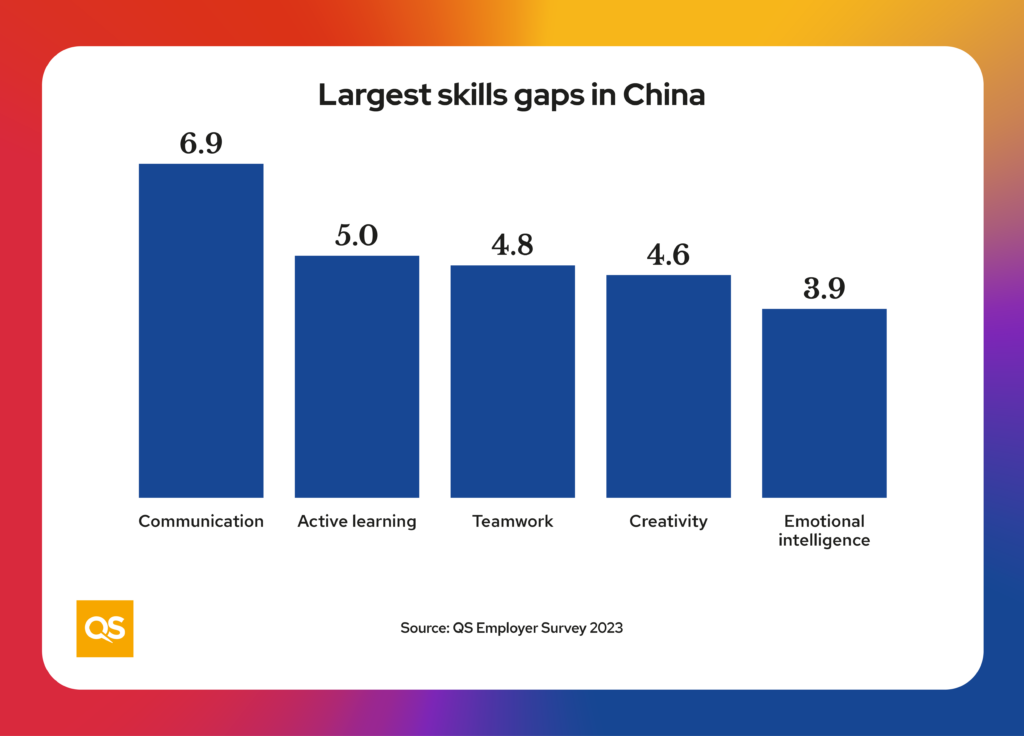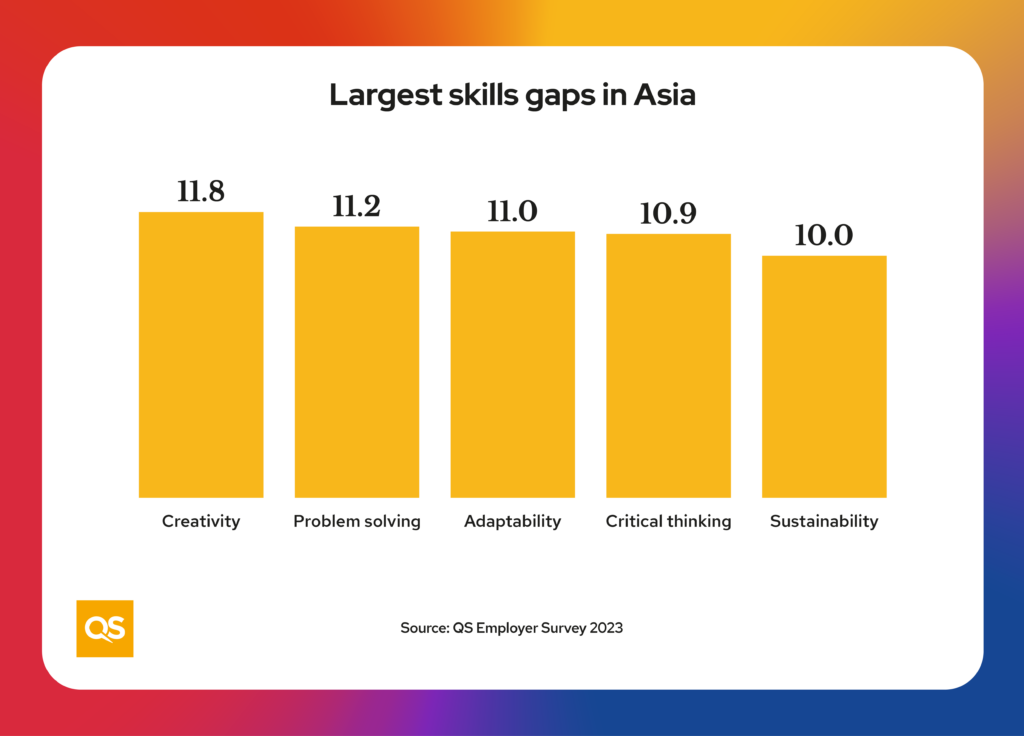
Recent data indicates increasing youth unemployment across China – emphasising the ongoing pressure on the job market for recent graduates in the world’s second-largest economy post-COVID-19.
Chinese businesses are also facing challenges, as they express dissatisfaction with some of the skills they require – with a significant skills gap score (assessing the disparity between the perceived importance of a skillset and satisfaction with them). Communication, active learning, and teamwork are all viewed as lacking among graduates from Chinese institutions.

At the QS China Summit 2024, there was recognition that the country’s higher education institutions must improve their educational approaches to cultivate essential skills and foster an entrepreneurial mindset among graduates to ensure their success in the professional world.
A panel of higher education and industry experts discussed this issue at the Summit. In the session, titled ‘Career catalysts’ they explored how institutions can support students into the world of work and empower them to contribute to the region’s growth and development.
Integrating soft skills-focused courses
During the panel, the first question asked was “What approaches and practices are you building into your programmes to equip graduates with the skills, agility and entrepreneurial mindset necessary for career success?”.
Jenny Jie Chen, Director of MSU China Joint Institute and MSU Centre for Alternative and Complementary Medicine at Management and Science University, answered by sharing the establishment of ‘Personal Enhancement courses’ at the University: “The courses have the explicit aim of improving students’ soft skills so they can fully contribute to society.”
“Every semester we have sessions – sharing experiences and updates with each other on what new trends companies are looking for. We also constantly update our curriculums, so students know the latest information, or the skills needed.”
What specific evidence do employers seek to assess a student’s employability skills and competencies?
Greg Au-Yeung, Managing Director and Head of China at Ingenico, an employer of Chinese graduates, highlighted that hard skills are a “pre-requisite” and that soft skills are crucial too.
“In our business where we have the Research and Development (R&D) function, you need to possess the technological knowledge that is suitable for our organisation. What is equally important is the growing importance of soft skills for organisations. Most top leaders within a company will possess these types of skills, in addition to the hard skills.
“When I worked for a previous employer, I found that at the Managing Director level, my colleague could still code, but it wasn’t the most important part of his role. It is how he could lead the teams and how he had a vision to share with the team, how he could organise the team to solve the problem so that they can move in the same direction. These are the type of traits we look for in graduates, and it is a balance, but soft skills will supercede the hard skills in years to come.”
Victor Kwok, Assistant Research Director, Head of Education & Youth at Our Hong Kong Foundation questions whether businesses and wider society want generic skills or job-specific skills.
“When we talk about generic skills, it’s important to define, very clearly, what kind of generic skills we’re talking about. Some schools think they’re doing very well, but employers do not necessarily agree. The problem boils down to one thing, which is that both have very different definitions of what those problem-solving skills might be.”
Victor continued, emphasising the importance of having “contextualised learning” in the university curriculum to equip students with essential skills.
“It’s important to understand that it’s hard to teach those skills. So, the best way to prepare them is by putting students through real-life scenarios. There is a reason why some academic institutions, nowadays, are actively pushing collaborative programmes where students go on a placement for a certain period of time in real industry settings.
“However, as skills are changing year-by-year, they’re becoming obsolete – but that doesn’t necessarily mean that we no longer need those skills. The programming language and the way you code might change, but the mentality may not.”

Notably, Chinese businesses are not alone in their dissatisfaction with certain skills among the graduates they employ – QS data reveals a widespread issue across the entire Asia region. The largest skills gaps in Asia, were found in ‘Creativity’ (11.8%) and ‘Problem-solving’ (11.2%).
Rethinking creative skills
Kwok added, “From an employer’s perspective, arguably, when they’re talking about creativity, they’re not necessarily talking about creating something out of the blue, they’re talking about pooling resources from within business units and helping the boss solve problems. There is a slightly different mentality than what schools are thinking about what creativity is.
“While acknowledging that creative skills may not always entail transforming company operations, there are some students who are passionate about changing the world. How can we foster an entrepreneurial mindset among our students to support those interested in starting their own businesses or ventures?
“Arguably, an entrepreneurial spirit doesn’t need to equate to entrepreneurs”, Victor remarked. “But the important thing is that they have tried it—they are able to look in communities, spot the problems, characterise, analyse, and make a business plan out of it!”
Fostering work-ready talent through collaboration
In response to the question about bridging the gap between student skills and industry demands, Dr Eric Yang, Vice President for Academic Affairs at Wenzhou-Kean University suggests establishing regular communication mechanisms between universities and industries.
“For instance, our University organises entrepreneurial round-table discussions with key industry stakeholders to understand the talents, skills, and qualities desired by their businesses. We also explore collaborative efforts to cultivate talent.”
Lastly, Dr Yang highlighted that while there is a need to involve the industry in designing the curriculum, we must also maintain the core values and principles of education.



